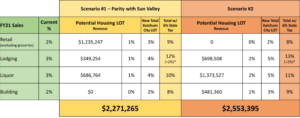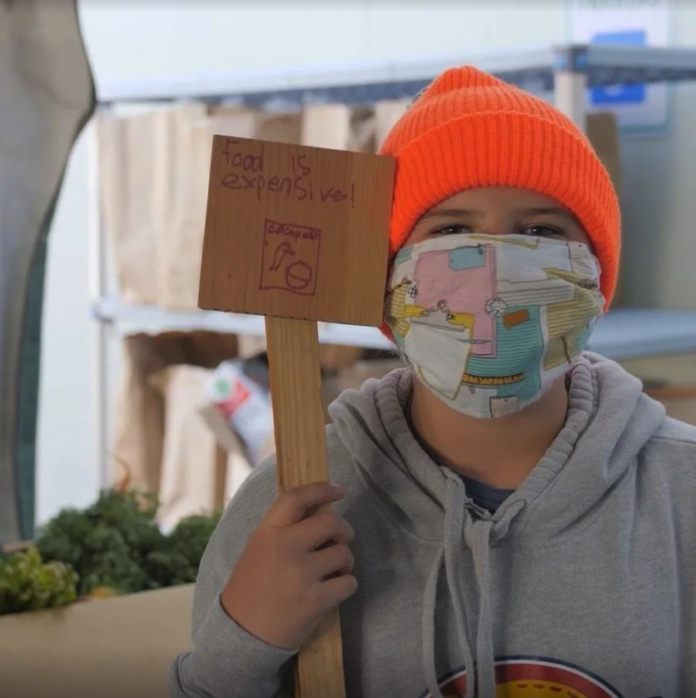Hunger Coalition, City of Ketchum team up to take on housing, hunger challenges
By Eric Valentine

Development in a capitalist society can make for interesting bedfellows. And when it comes to wrapping one’s head around the overlap here of food insecurity and an affordable housing crisis, any partnership that helps the Valley’s working class can’t come soon enough.
The Hunger Coalition is partnering with a City of Ketchum task force to help address the affordable housing crisis and resulting hunger crisis in Blaine County. In 2021, The Hunger Coalition provided food for 1 in 4 local people and 2,330 of them were new to the organization, indicating both a population growth and a food insecurity among the working class. Over half of new families reported housing insecurity, compromising their ability to buy food.
Last month, Carissa Connelly, housing strategist for the City of Ketchum, attended a food distribution at Bloom Community Food Center, in Bellevue, to get a better idea of the community’s housing needs. That day, Connelly spoke with dozens of people who shared their struggles with housing. She spoke with people living in trailers, couch surfing, or crowding three generations into a single-family home.
Hunger Coalition participants are living in poverty, or, put another way, they are Asset Limited-Income Constrained-Employed (ALICE) households. ALICE households can be making the area median income of $75,000 for a family of four, and still living paycheck to paycheck in poverty-like conditions in Blaine County because of the cost of living. In 2018 and pre-pandemic, 41% of Blaine County households were ALICE, and an additional 11% were below the federal poverty level of $26,500 for a family of four. In housing-speak, this means Hunger Coalition participants are low- and middle-income households, many of whom are forced to choose between paying rent and eating.
Stories of Housing Insecurity
Connelly and Jenni Rangel, a resource coordinator for The Hunger Coalition, recorded stories from local people who shared their housing experience. Regarding one family that lives in a two-bedroom house with six adults, Rangel said, “The adults in the household are single and employed through construction. The two-bedroom and one-bathroom house is being rented at $3,000 per month. Having six people in the home is the only way they could afford rent in the valley. Rent does not include utilities.”
“[The community] should look at prioritizing people here for housing, even seasonal,” commented another individual who returned from working on the river to find their rent doubled. “Now living in my car, it’s one-on-one survival.”
Another resident shared that their rent increased by $1,000, which they could not afford since the woman recently gave birth and only the husband, who works in construction, was able to work. They had to move or face eviction.
Help may not come soon enough for those residents, but Connelly said the The Hunger Coalition and Ketchum partnership means the Valley is taking a step in the right direction.
“During my time at The Hunger Coalition, I spoke with seniors on a fixed income, an outdoor guide, teachers—including one who retired early due to a disability—tradespeople and professionals, all experiencing housing insecurity,” Connelly said. “The conversations confirmed what the data says: Low- and middle-income households desperately need housing support. There are professionals experiencing homelessness, people foundational to our economy working three jobs and still low-income, and people who are low-income because they are unable to work. I have faith that we can actually do something, but we need to come together.”
Connecting The Disconnect
Kristin McMahon, communications supervisor for The Hunger Coalition, said her organization and Ketchum city leaders are doing more than just addressing the effects of the crisis. The two entities are working to address the root causes of quality-of-life challenges; namely, a disconnect.
“A challenge in our tourist economy is a disconnect between the second homeowners and year-round locals. So long as the runs are groomed and rooms are clean, it’s hard for a part-time population to really see the struggle of our teachers, housekeepers, first-responders, waitstaff, lift operators, fishing guides, landscapers, childcare and hospitality workers,” McMahon said. “The lifeblood of our community is being driven out of the Valley and we need to reckon with this crisis before it’s too late.”
Enter the City of Ketchum Housing Action Plan. In response to the housing crisis, the City of Ketchum is developing a plan in collaboration with a housing task force composed of a cross-section of community members. Actions being analyzed include:
• Rental assistance
• Incentives for converting to long-term rentals
• Preserving existing affordable housing
• Homeownership assistance
• New housing development
• Zoning changes
To ensure adequate funding for these actions, the Ketchum city council is considering putting the Local Option Tax (LOT) on the May ballot. The measure—if approved by voters—would allow Ketchum to use a portion of its sales tax revenues to offset housing costs. An approved measure would levy sales taxes on the following types of purchases:
• Lodging— a 2% increase
• Liquor-by-the-drink (e.g., drinks bought at bars, pubs, etc.)—a 2% increase
• Construction materials (excluding workforce housing construction)—a 1% increase
The city has not proposed an increase in LOT for general retail sales. Ketchum’s city council will determine the final ballot language and percentages. Ketchum voters will decide whether to implement those proposed tax increases.
A sign that at least some voters are ready to chime in would be a large amount of participation and feedback on ProjectKetchum.org—the city’s new website to find information on significant projects and initiatives taking place in Ketchum.
“We have received more than 386 responses to our parking survey and are getting multiple views on our housing initiative,” said Ketchum Mayor Neil Bradshaw in his most recent issue of the Mayor’s Missive. “Communication and transparency remain our priority and we are delighted with the response to this new website.”
Editor’s Note: Visit ProjectKetchum.org/Housing-Matters to see trends, updates, engagement opportunities, and data sources.



